Pittsburgh Periodontal Therapy
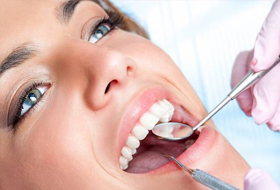
Gum disease is an oral health condition that affects 50% of adults over the age of 30, and that number jumps to 80% for patients over 35. Additionally, advanced gum disease, periodontitis, is the leading cause of tooth loss for patients in this demographic group. What may be more startling is the fact that gum disease should be preventable. With thorough at-home brushing and flossing and six month dental exams, the majority of people will never have to deal with this detrimental oral health concern. That’s why the Advanced Dental Solutions of Pittsburgh team is dedicated to helping patients keep their smiles healthy and avoid gum disease with regular screenings and professional deep cleanings twice a year. If you want to learn more about gum disease therapy or any of our other dentistry services, call our dedicated dentistry team to schedule an appointment today.
What is Gum Disease?

Gum disease is a condition that occurs when plaque and tartar buildup at the gum line irritates soft tissue, leading to swelling, inflammation, or infection in the soft tissue. Over time, this causes the connective tissue between teeth and gums to breakdown. In the early stages, gum disease may be referred to as gingivitis, and it has very mild symptoms. In the advanced stages, it’s referred to as periodontitis, and it can have very severe oral health effects, including tooth loss.
How Will I Know I Have Gum Disease?
During a dental exam, we will screen for the early warning signs of gum disease, but you should let us know right away if you notice any of the following warning signs of gum disease:
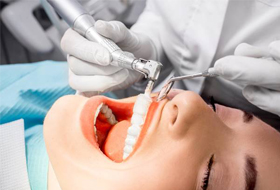
- Discolored gum tissue
- Gums bleeding during tooth brushing and flossing
- Inflammation or infection in the soft tissue
- Teeth that look longer or gums that are receding
- Teeth that feel loose or a bite that doesn’t fit together properly
How is Gum Disease Treated?
Your gum disease treatment will depend in large part on the severity of the condition. In the early stages, more frequent professional teeth cleanings and better at-home care are enough to improve oral health. In the advanced stages, you may need some combination of the following treatments:
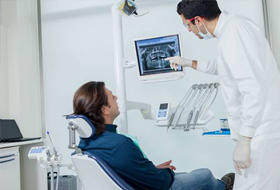
- Scaling – the systematic removal of plaque and tartar buildup and damaged tissue
- Root planing – the smoothing of tooth roots to prevent further buildup of plaque and tartar
- Antibiotic therapy – to reduce the numbers of plaque-producing oral bacteria
More frequent professional teeth cleanings and changes to your at-home hygiene routine may also be necessary to maintain improved oral health following your advanced periodontal therapies.
Scaling & Root Planing
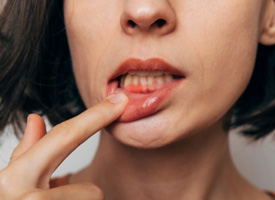
Scaling and root planing usually go hand-in-hand. One part of this gum disease treatment focuses on eliminating the source of infection, while the other helps the gums heal and prevents future reinfection. Rest assured, we’ll go over the process in more detail with you during your consultation, but in the meantime, you can get a general sense of what to expect by reading the information below. As always, don’t hesitate to let us know if you have any questions or concerns about your treatment!
Do I Need Scaling & Root Planing?

Generally, scaling and root planing treatments are reserved for patients with an advanced case of gum disease. When gum disease bacteria travel deep into your pink oral tissue, your everyday toothbrush and toothpaste can’t reach them. We’ll recommend increased at-home oral hygiene efforts when possible, but sometimes it’s necessary for us to use our special tools and training in order to completely remove the disease from your smile.
If you experience any of the following symptoms, call our office right away so we can help you build a timely treatment plan:
- Small amounts of blood on your dental floss, toothbrush, or in your sink after rinsing your mouth.
- Red or puffy gums.
- A receding gumline.
- A lingering bad taste or odor in your mouth.
- Shifting teeth.
- Difficulty or discomfort while chewing.
The Process of Scaling & Root Planing
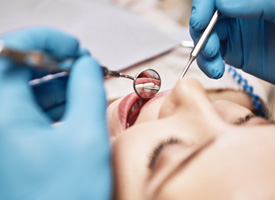
First, we’ll start by “scaling” your teeth and gums – which isn’t as bad as it might sound. Scaling is actually very similar to a regular teeth cleaning. We’ll remove plaque and tartar from your pearly whites like normal, but we’ll also target build up beneath your gumline. Essentially, the goal is to clean out as many gum disease bacteria as possible.
It’s important to understand that gum disease bacteria can form “pockets” in your gums that make it easier for reinfection to occur. Mitigating this is what root planing is for. We’ll gently smooth out these areas to encourage your gums to reattach to your teeth, eliminating gum disease pockets.
Aftercare Tips for Scaling & Root Planing

Since we’ll numb your mouth with a local anesthetic before beginning your scaling and root planing treatment, we recommend that you avoid eating for a few hours afterwards. Otherwise, you could accidentally bite down on your soft oral tissue and aggravate your gums.
We also recommend rinsing your mouth with a salt water mixture for the next several weeks. Salt has antibacterial properties, so swishing it around your mouth can promote healing and help protect your gums. If you experience discomfort or soreness, be sure to take an over-the-counter pain reliever like ibuprofen or Tylenol.
Finally, continue to brush your teeth twice daily and floss at least once per day. You can clean more gently near your treated gums until they’ve healed, but consistent oral hygiene habits will help prevent more bacteria build up!
Can I Prevent Periodontal Disease?
In most cases, the answer is yes. For the majority of patients, brushing teeth for two minutes at a time twice a day, flossing daily, and visiting our office twice a year is effective in preventing periodontal disease. However, some patients naturally have higher levels of detrimental oral bacteria that can make this more difficult. Additionally, patients with immune suppressing chronic illnesses like diabetes should take special care if they notice changes to the appearance of gums, swelling, or sores in the mouth. Patients experiencing hormonal shifts such as expectant mothers and patients over the age of 50 are also at higher risk for gum disease.
